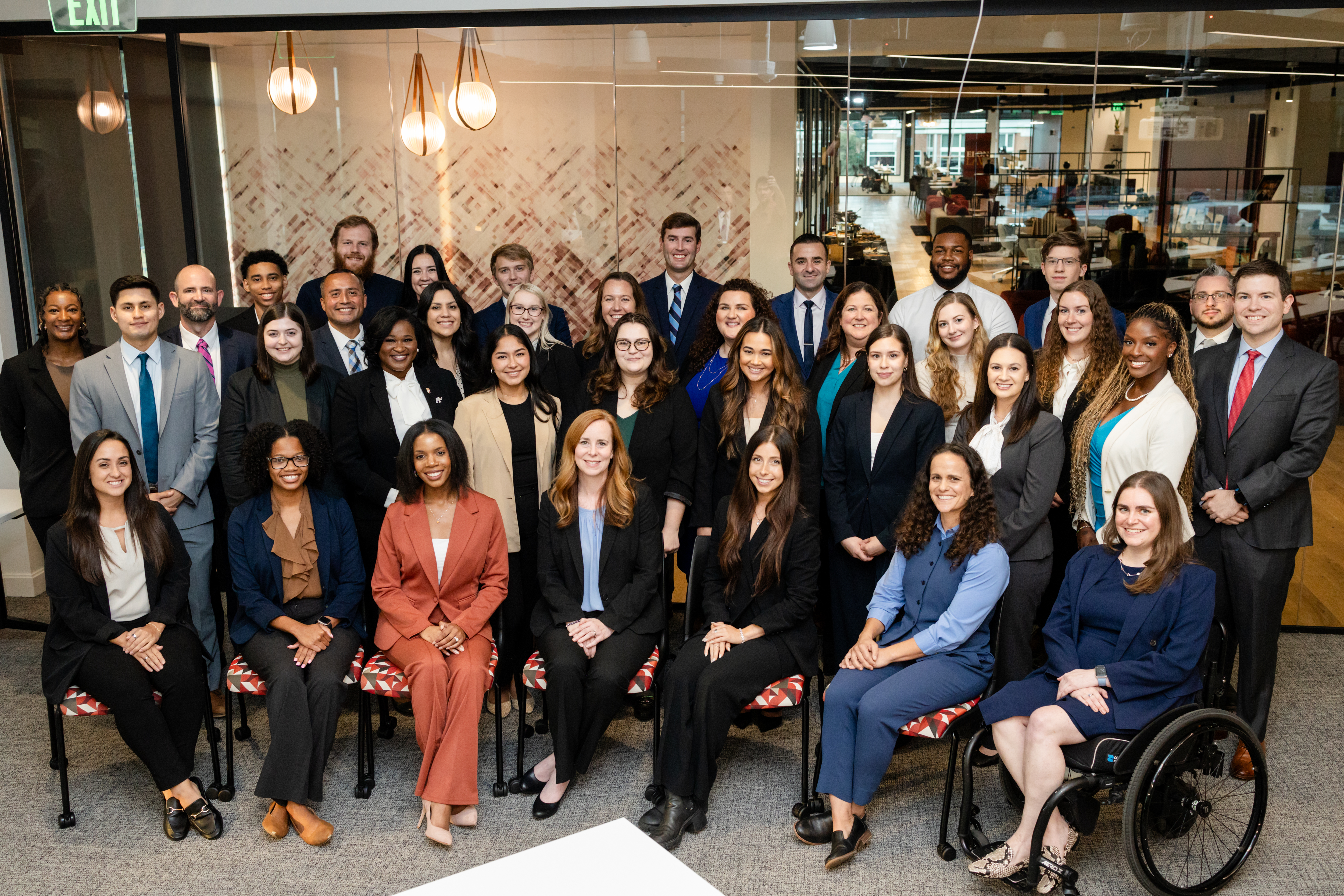Thirty-six women and men with an array of academic interests and career backgrounds comprise the charter cohort of an in-person, part-time program of legal study for working professionals in North Carolina’s largest city.
They work during the day as legal assistants and project managers and account executives. Their educational backgrounds include college majors in political science, criminal justice, psychology, business, education, and more.
They live across the Charlotte metro area and studied at many of the region’s top universities, such as Vanderbilt, Clemson, UNC Charlotte, the University of South Carolina, and Florida State University, among others. In total, 24 undergraduate alma maters are represented.
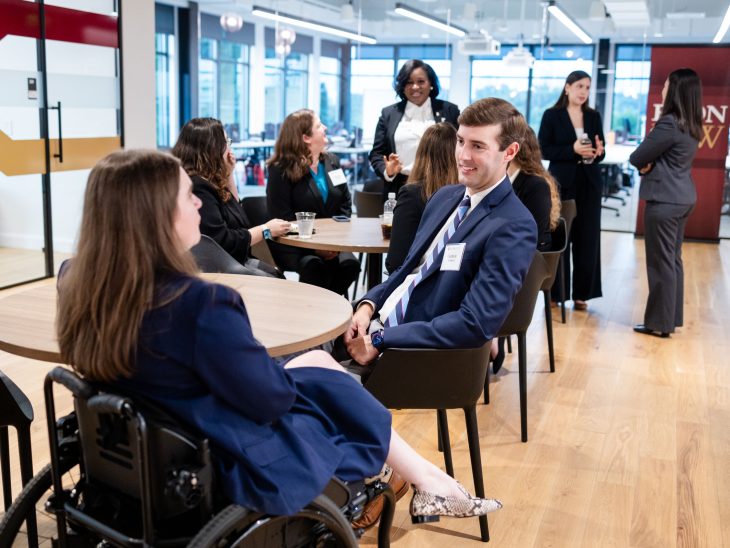
Two have worn a military uniform for the United States of America. A dozen hold graduate degrees. Their average age is 29. Nearly two thirds are women. One third identify as students of color.
Their common goal: earning a law degree at night.
Thirty-six students comprise the charter cohort of the Elon Law Flex Program, a part-time, in-person program of legal study with evening classes offered at Elon University’s Charlotte campus in the city’s South End neighborhood.
Students in that inaugural class gathered for the first time on August 13, 2024, in an evening program that included administrative tasks and a Convocation ceremony featuring remarks by Elon Law leaders and a prominent North Carolina District Court judge.
As with Convocation one week earlier for full-time Elon Law students in Greensboro, the ceremony served as an official introduction into the academic, intellectual, and professional communities of Elon University and its School of Law.
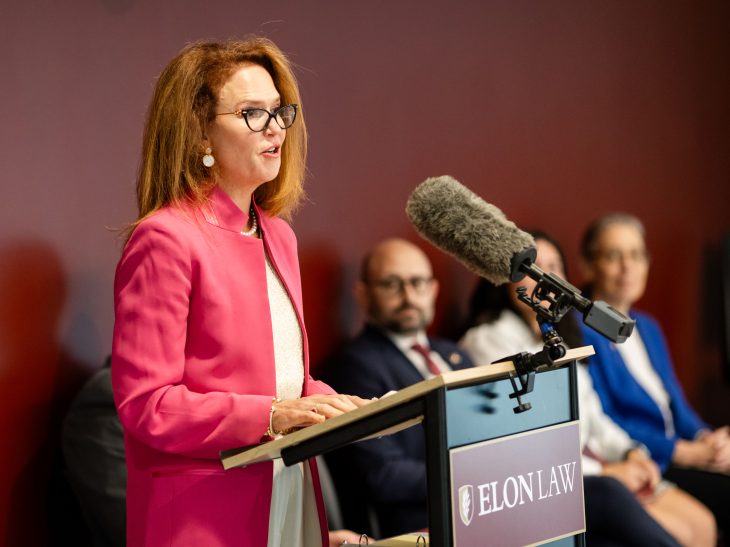
“You are embarking on a path to join the profession that is necessary to a free and fair society,” said the Hon. Elizabeth Thornton Trosch, a North Carolina District Court judge in Charlotte who delivered the Call to Honor address during Convocation. “It is not enough to be guardians of the law. Collectively, we have to, by our conduct, earn the public’s confidence that we will not be swayed by self interest, greed, convenience or power.
“It is our individual and collective honor that makes us trusted guardians of the fair and orderly application of the law. We are called upon to practice the highest standards of character, integrity and decorum in all of our dealings. You are now part of something bigger than yourself.”
Convocation featured welcoming remarks from Elon Law Vice Dean Alan D. Woodlief, Jr., and Caroline Decarvalho L’24, treasurer of the Elon Law Student Bar Association.
- “Attorneys occupy a powerful position in our society and, as a member of the legal profession, an attorney is a representative of clients, an officer of the legal system, and a public citizen having special responsibility for the quality of justice. And with this powerful position comes great responsibility. My colleagues at Elon Law and I will strive to equip you with the knowledge, skill, and professional training to fulfill these responsibilities to clients, the legal system, and society.” – Vice Dean Alan Woodlief
- “Though our curriculum timelines differ, the core experience is all the same. We all share something fundamental. We are all forest and foremost students. We’re learning a new language and discovering new ways of understanding complex programs and developing the skills needed to make sound judgments on behalf of our future clients.As law students, embrace the changes that come your way. Absorb as much as you can: the good, the bad, and the ugly. Because everything you learn from now on will shape you as an advocate as a future member of this esteemed profession.” – Caroline Decarvalho L’24
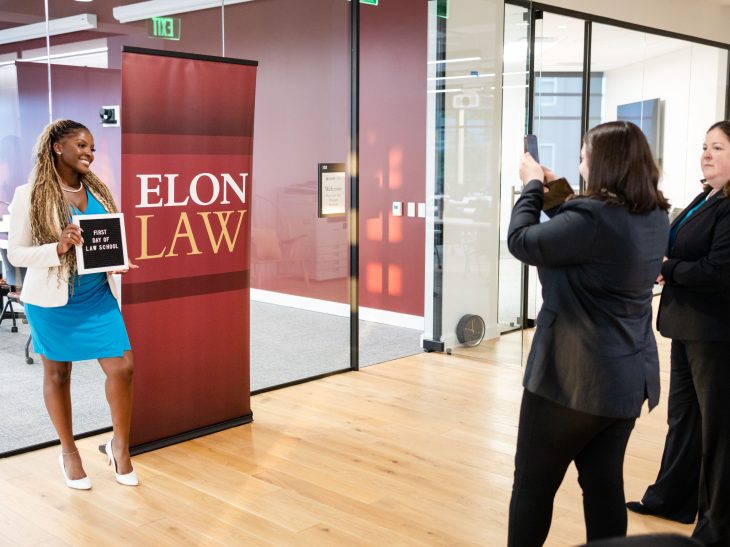
As with Convocation for full-time students in Greensboro, the Call to Honor address was followed by each student’s name and undergraduate alma mater read aloud as they signed a poster with the four tenets of the Honor Code — honesty, integrity, responsibility and respect — to be displayed on campus. Woodlief included in his introductions a brief description of each student’s professional role.
Students were then given an acorn. At Elon — Hebrew for “oak” — all new students receive an acorn at the start of their studies, a symbol of their potential for growth. All graduates of Elon University later receive an oak sapling at the conclusion of their Commencement ceremonies, a tradition that started more than three decades ago.
Elon Law Dean Zak Kramer concluded the ceremony by emphasizing for students the opportunities, responsibilities, and power earned through a legal education and practicing law.
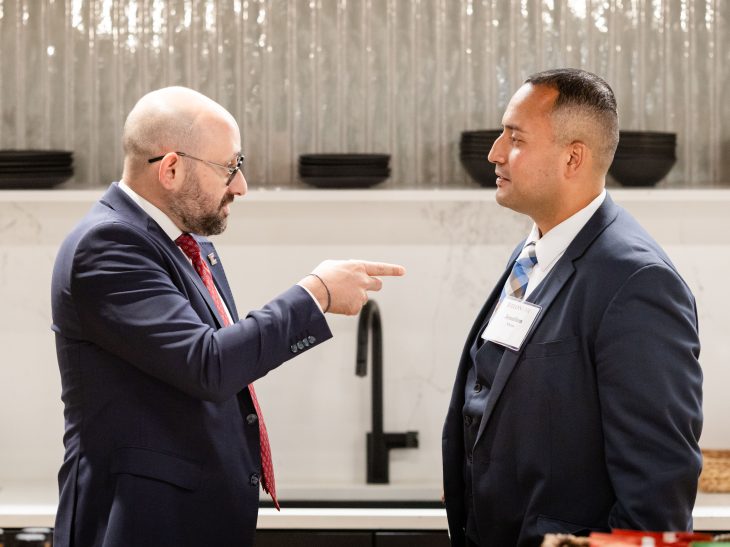
“Our charge to you as you are embarking on this wonderful experience of going to law school is to soak up everything that you get. Engage every resource that we can give you,” Kramer said. “Please find ways to change the world with this degree, to help people, serve the community, create opportunities for those around you, and have a wonderful, wonderful time. All of us at Elon Law and Elon University are delighted to have you with us. It is an evening of firsts. It’s a very big first for us. It’s an even bigger first for you.
“Congratulations on taking this leap. We’re here for you every stop of the way. Your dreams are precious to us.”
About Elon University School of Law
Elon Law is the preeminent school for engaged and experiential learning in law. With a focus on learning by doing, it integrates traditional classroom instruction with a required, full-time residency-in-practice field placement for all full-time students during the winter or spring of their second year. The law school’s distinctive curriculum offers a logically sequenced program of professional preparation and is accomplished in 2.5 years, which provides exceptional value by lowering tuition and permitting graduates early entry into their careers.
Elon Law has graduated more than 1,500 alumni since opening its doors in 2006. Its annual enrollment now tops 440 students and the law school is regularly featured in PreLaw Magazine’s “Best Schools for Practical Training” rankings, reaching #4 in the nation in 2024. The Elon Law Flex Program, a part-time, in-person program of legal study for working professionals begins in Fall 2024 at Elon University’s Charlotte campus.



